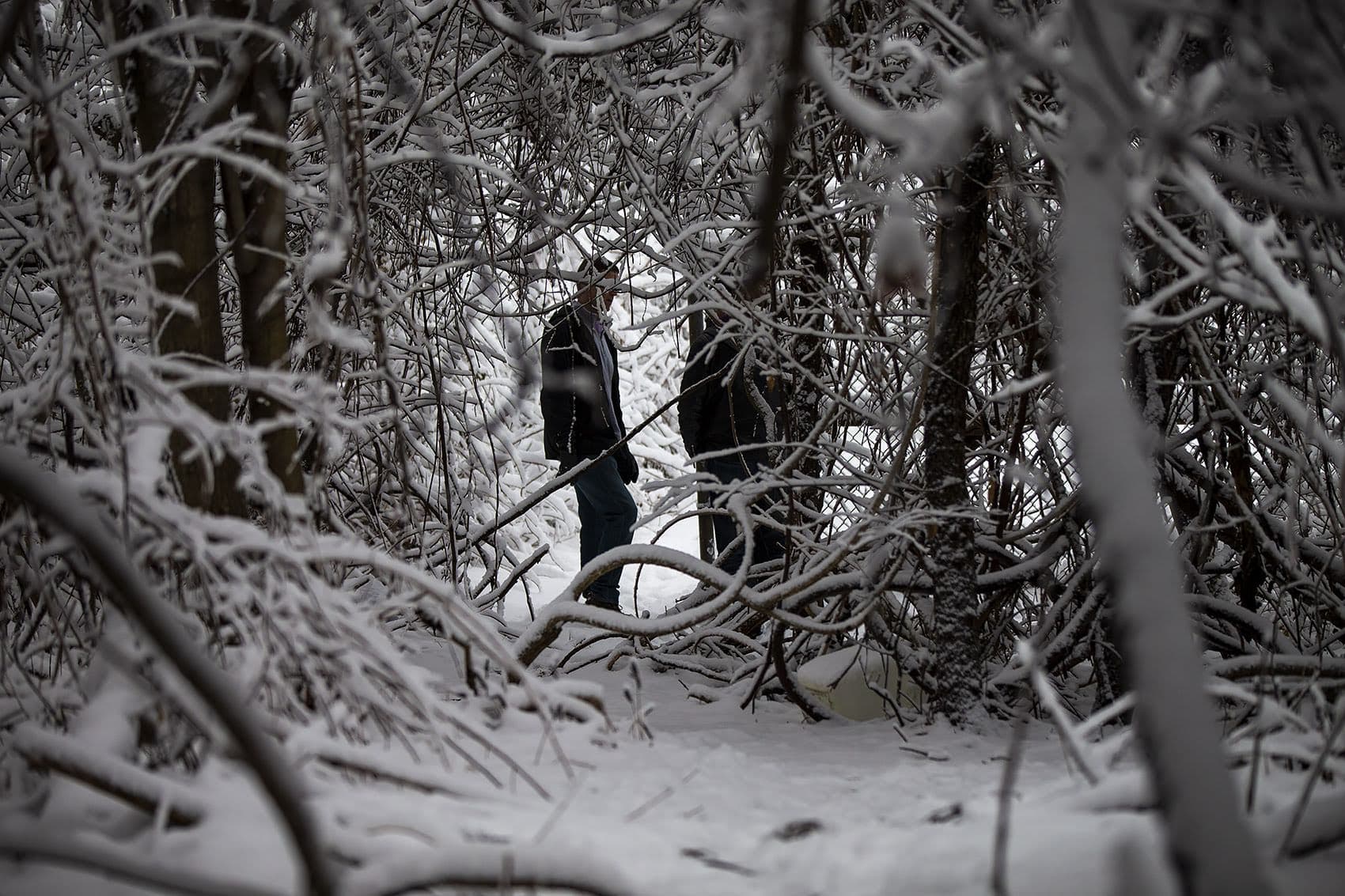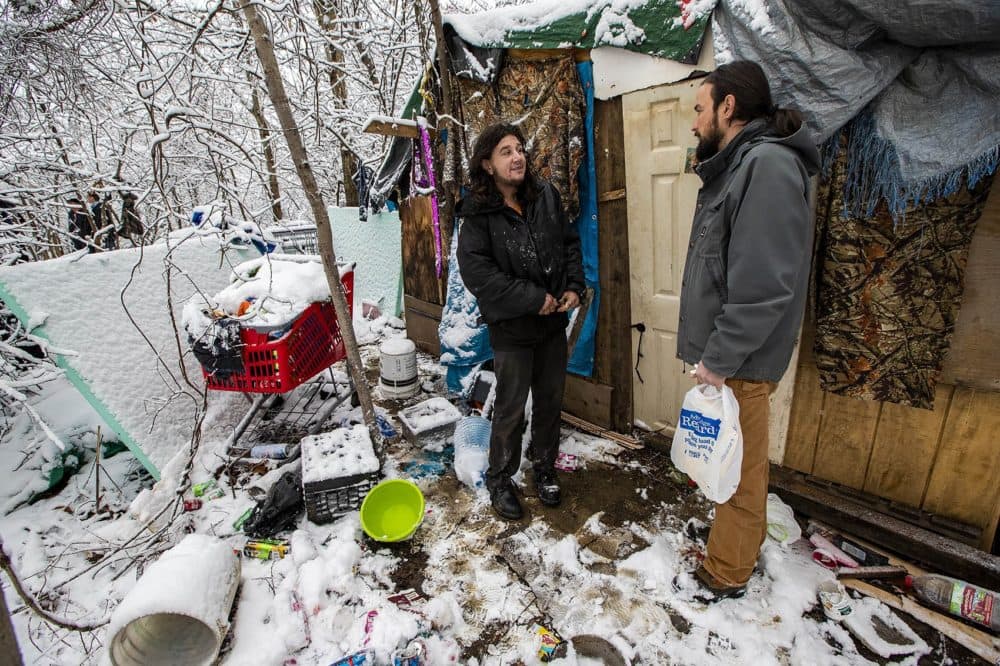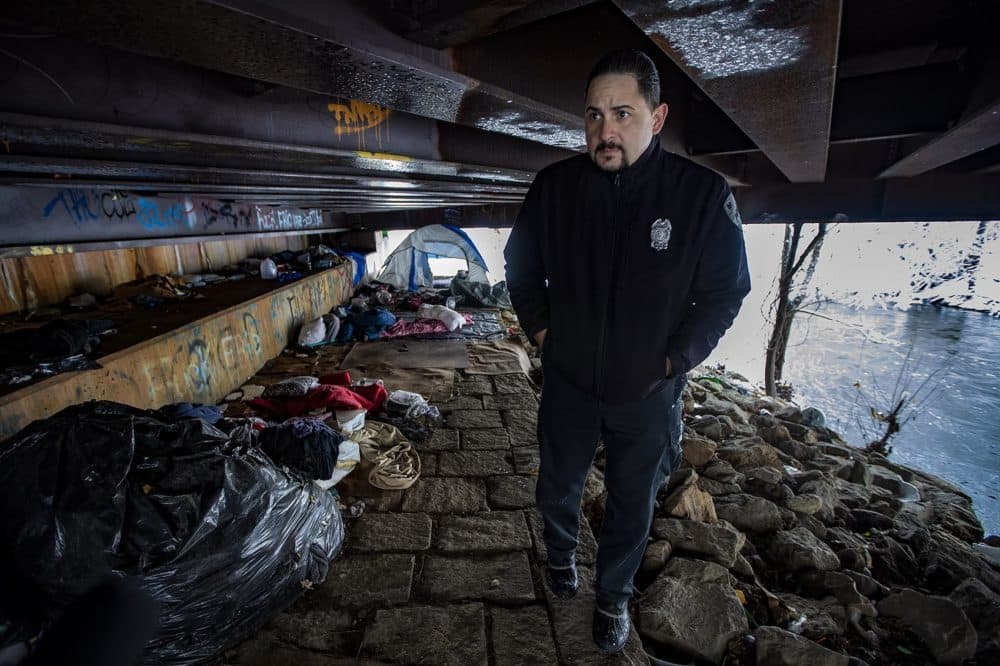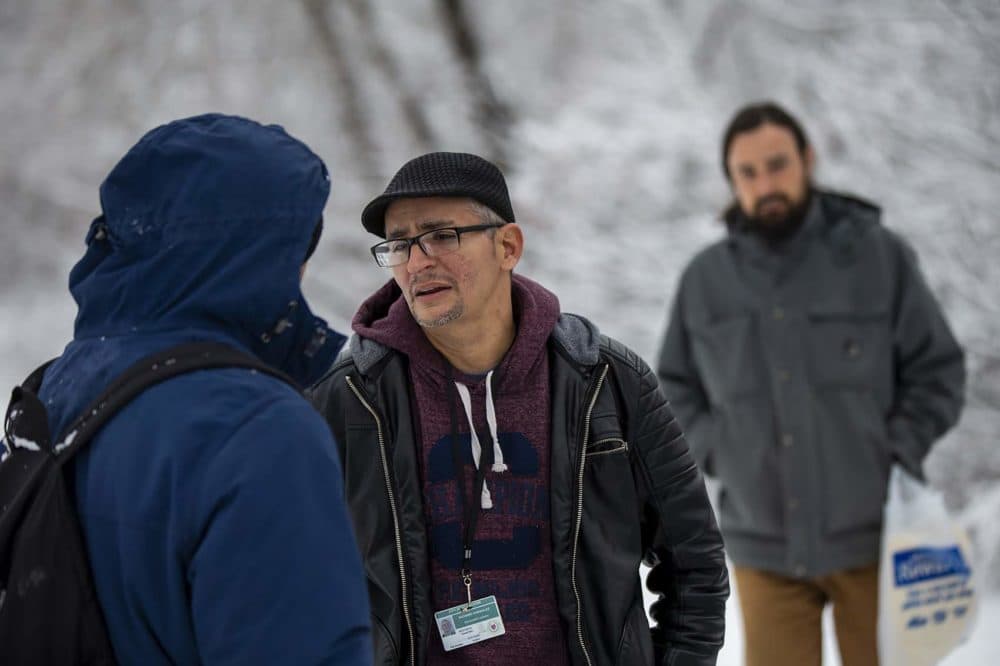Advertisement
To Fight Chronic Homelessness, Worcester Is Building Connections — And Modular Housing
Resume
Part four of a four-part series. Here are parts one, two and three.
Walking into some woods in Worcester, high up along I-290 and blanketed in a fresh coat of snow, Evis Terpollari knows exactly who he's looking for. He's been here before.
He's here to see Monte Kelly and Kelly's partner. Kelly comes to the door of the couple's shack.
"Hello. How's it going?" Terpollari asks Kelly, who responds, "Doing all right."
Terpollari is Homeless Projects Manager for Worcester's health and human services department. He leads homeless outreach efforts for the city's Quality of Life Task Force. The group works to connect people who are living on the streets with housing and support services.
Kelly and his partner came to Worcester in August after living in Clinton and Athol.
"This [shack], I built in November," Kelly says. "I had one last year in Athol that somebody tore down with a bulldozer."
Scattered between the trees around the shack are several shopping carts. Kelly used them to haul wood scraps he pulled from dumpsters to build the shack. He even installed a metal pipe in the roof as a chimney — for a makeshift wood stove inside.
Pieces of the couple's clothing hang from the trees. But they're soaked from the snow.

Kelly and his partner are transgender. He says they weren't treated well in towns where they lived before and now routinely face discrimination when people learn or assume they're homeless.
"We're just as much people as everybody else," he reflects.
Kelly says the Worcester outreach team has been the first ray of hope.
"I mean, I think everybody deserves to have housing and be seen as another human being, you know?" Kelly says. "I feel like if we just had housing, you know, we could probably live our lives out quietly for as long as anybody let us have housing for."
'I Think You Can Draw People In'
Terpollari has come with good news. He's going to present the couple's case to the Worcester City and County Continuum of Care, or CoC.
CoCs are regional planning bodies required by the U.S. Department of Housing and Urban Development to work to get people out of homelessness. They're made up of nonprofits and government agencies. Terpollari will tell the CoC that Kelly and his partner are ready for housing and have the proper documentation.
"We're hoping for a single apartment," Terpollari explains. "There's project-based apartments, or there's funding that we can take and work with landlords to secure the appropriate apartment."
In addition to Terpollari, the outreach team includes some Worcester police officers, city inspectors, and a certified recovery coach.
Monte Kelly says he's struggled with mental illness and substance use. The team will make sure he's connected with a case manager who will help him stay on top of appointments, budgeting and other needs.
"The part of the outreach and how we work with people is incredibly important," says Dr. Mattie Castiel, Worcester's commissioner of health and human services. Castiel, who is also a primary care physician, started in the city post in 2015. Worcester had just formed its Quality of Life Task Force. When she went out with the group to the street encampments, she was blown away by the need and the team's response.
"The things that they do — the recovery coach and the outreach worker — to [be] able to have that compassion and to work with people, I think you can draw people in."
In the past year, the outreach team has worked with about 250 unsheltered adults. It's housed almost 60. And it's helped more than 80 people into detox and addiction treatment programs.
It's all part of a plan Worcester launched two years ago to end chronic homelessness. But the city already accomplished that once before. In 2011, the U.S. Interagency Council on Homelessness declared Worcester the first city of its size to effectively end chronic homelessness.
Dr. Castiel, who was on a homelessness task force in Worcester at the time, says the city then dropped the ball.
"After we reach functional zero, it's like it all stopped. ... We stopped meeting," Castiel recalls. "I think the idea behind this is that this is a constant piece that we have to constantly evaluate the data, see the numbers that are coming in, and adjust to that and figure out what we do."
Part of the new push is data. Worcester is tracking who's using homeless shelters and living on the street in order to have a grasp of the need.
Moving Toward Micro-Housing
And the city has set a goal to create 103 new units of permanent supportive housing for people who've been chronically homeless by the end of 2020.
To help reach that target, it's planning two modular buildings of micro-units — with support services on site.
The units would be efficiency apartments with their own kitchens and bathrooms; they would be built off-site and trucked in. They're expected to cost under $100,000 dollars each to produce. That's less than half of what it costs to develop traditional affordable housing units.
"This is something that could fit in on any city block almost," says Joe Finn, executive director of Massachusetts Housing and Shelter Alliance.
The group worked with Worcester on the concept and is trying to get other communities to develop modular micro-housing to help end chronic homelessness.
"I'm hoping that particularly as communities struggle with people living outside ... that we can provide a different model where we can actually get folks a place to live," Finn says.
The Worcester Housing Authority is planning 25 modular micro-units in one building. The social service agency South Middlesex Opportunity Council plans another 18 units. They're the first to apply for state funding for such projects.
If the developments become a reality, they'll give Worcester's Quality of Life Task Force more options to get people from the streets into their own homes.

The outreach team's final stop on the day we're with them is an encampment along the Blackstone River. The site is covered with debris, garbage, tattered clothing and sleeping bags. But no one is here.
Worcester Police Officer Angel Rivera says it's state-owned property, but the state isn't kicking out the people camping here. That means the team can keep coming back to try to engage with them.
"Some of them are receptive to getting treatment for substance use disorder, and some of them are not," Rivera says. "Once someone else leaves, someone else comes in and we try to reach out to them and get them the services that they might need."
On the way out, the team comes across a man walking in the area. Recovery coach Richard Gonzalez recognizes him.
"How you doing with your recovery right now?" Gonzalez asks.
"Oh, I've been clean for a long time," the man responds.
His name is Eduardo Vasquez. He says he's been sleeping in some sort of metal tank nearby.
"But I have to survive, and and I cannot let myself die," Vasquez says.
Terpollari, from the city of Worcester, makes plans to meet with Vasquez later that week. Gonzalez tries to convince Vasquez to go to a shelter to sleep in the meantime.
"Come tonight and sleep there for tonight. Just try it," Gonzalez urges, telling him if he doesn't feel comfortable, he can always leave.
Vasquez says he'll think about it. Through years of drug addiction and homelessness, he says he's become very isolated. He stopped seeing his doctors and psychologists. But now he's ready for a change.
"I want to have my own place for once, because I'm 43 years old and never have a place in my life," Vasquez says. "I've been bouncing around for places to places and relationship from relationship. ... But never have my own."
"I think this is the moment," Gonzalez tells him. "There is help out here. And just engage in it, you know, engage it. Follow up with your appointments. I know it's hard."

Gonzalez can relate. He's in recovery from a long battle with drug addiction.
He and the other team members know breaking through with people living on the streets takes time and patience — but it's all worth it.
Monte Kelly and his partner, who were living in the shack in the woods, recently moved into an apartment thanks to the task force's engagement.
Kelly says it's been an adjustment, but that he and his partner can now "re-join the regular world" and think about the rest of their lives.
This segment aired on February 7, 2020.

